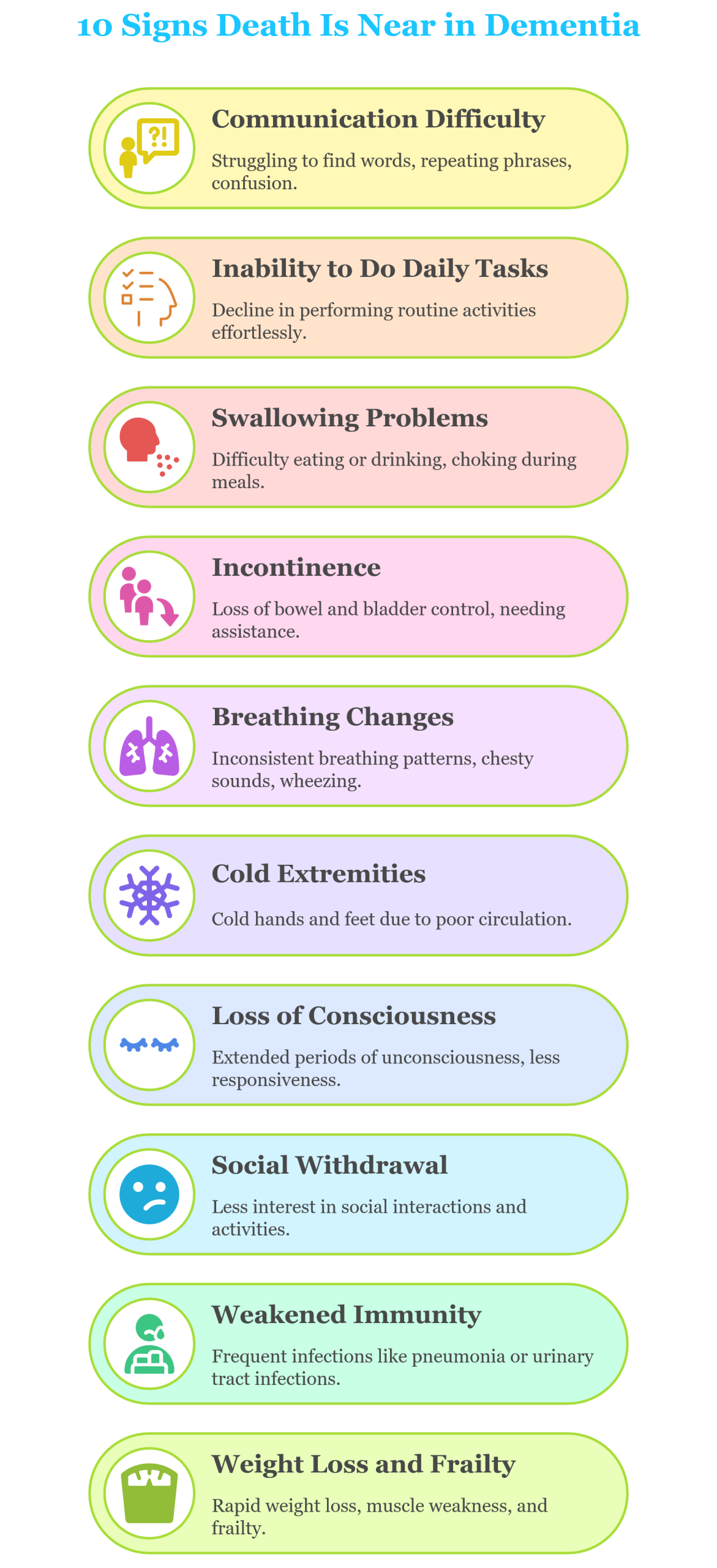Dementia is considered the seventh leading cause of death among the elderly from a global perspective. However, as the stages of the disease advance, the symptoms worsen over time.
Your loved ones may start seeing or hearing things that are not real, may become withdrawn from society, and may not be able to carry out activities as usual. These symptoms may get worse over some period of time.
Such symptoms should never be ignored if you observe them in your loved ones; this is a clear indication of the upcoming end-of-life transition of your loved ones. A deep understanding of such signs can help caregivers prepare for the tough time.
In this blog, we’ll highlight the top 10 key signs signaling the possible transition to end-of-life. Let’s get started exploring each one by one!
10 Signs Dementia Is Leading to End-of-Life of Your Loved One

When you see your loved one grappling with dementia symptoms, several signs may show up indicating their end of life. Some of them are:
1. Difficulty with Communication
Your loved ones might struggle to find the right words following the conversation. They may repeat the same words multiple times and seem confused or lost during the conversations. This sign of your loved one struggling to express themselves or communicate could be a sign that they are in the late stages of Dementia.
2. Can’t Do Daily Tasks
You may see that your loved one faces trouble while doing everyday activities they were able to manage effortlessly in earlier days. This decline in your loved one’s ability to perform routine tasks signals that their dementia stage is progressing. Click to learn more about providing dementia care & support to your loved one in your own home.
3. Eating Issues – Difficulty While Swallowing
Your loved one might struggle with eating or drinking. They may experience difficulty while swallowing and sometimes choke or cough during meals. It’s a common symptom experienced in later dementia stages.
4. Bowel and Bladder Incontinence
As dementia stages progress, your loved ones might lose control over their bowel and bladder functions. They might need assistance with toileting more often. You might need to change their clothes or bedding more often to manage these issues. This is a red flag in seniors, which often states that they have entered the advanced dementia stage.
5. Breathing Pattern Changes
Your loved one’s breathing patterns may become inconsistent as Dementia progresses. You may hear a chesty sound when your loved one lies down or tries to breathe deeply.
This might be caused due to fluid accumulation in the lungs. These wheezing or rattling breathing sounds indicate they are nearing their life’s end.
6. Cold Hands and Feet
Dementia slows down bodily functions as the last stage progresses. You may find that your loved one’s feet and hands start turning colder. This is often due to poor blood circulation, indicating the body is gradually shutting down.
7. Loss of Consciousness
Dementia disrupts sleep-wake cycles! It may lead your loved ones to experience extended periods of unconsciousness. Sometimes, your loved one may become less responsive to stimuli and drift in and out of consciousness. If you see your loved one experiencing loss of consciousness, it can be a sign of nearing the end of life.
8. Withdrawal from Social Interactions and Activities
Social engagement is crucial for Dementia patients to survive and thrive. However, as dementia progresses, people often become less interested in engaging with loved ones or participating in activities they once enjoyed. This can lead to health risks like depression, cognitive decline, and emotional and physical fatigue.
9. Persistent Infections and Weakened Immunity
Another common sign includes a weaker immune system, making individuals more susceptible to frequent infections like pneumonia or urinary tract infections. These changes often lead to health risks related to respiratory and oral diseases and the ability to recover and fight illnesses.
10. Severe Weight Loss and Frailty
Rapid and noticeable weight loss, combined with muscle weakness and frailty, is common in preclinical and clinical dementia or advanced dementia. This decline directly hints at the body’s inability to absorb or process nutrients effectively, reducing overall strength and mobility.
Caregiver Advice: How to Prepare for the Loss of a Loved One with Dementia?
Seeing your loved one in the later stages of dementia is emotional and might sometimes affect a person’s mentality. Following are some tips that will help you get ready for those critical times:
- You should educate yourself about the symptoms of late-stage Dementia. You should actively seek strategies to address these difficulties.
- You should foster open communication with your loved ones and healthcare professionals to ensure effective end-of-life care.
- You collaborate with care communities and develop a care plan that addresses both medical treatment and end-of-life wishes of your loved one.
- You avail yourself of counseling or therapy services to deal with the emotional burdens associated with Dementia caregiving.
- You consider attending to legal and financial issues as your loved one reaches the end of life. Read our guide on early-onset Dementia and learn how to plan for the future of your loved ones.
- You should not forget to take care of your physical and emotional well-being.
Hospice and Memory Care Support
Families often ask when hospice or specialized memory care becomes appropriate. Typically, hospice is considered when a doctor believes life expectancy is six months or less. But many families wait too long, missing out on valuable support.
- Hospice care focuses on comfort and dignity, not cure. It provides round-the-clock support for pain management, hygiene, emotional counseling, and end-of-life planning.
- Memory care communities offer structured environments, compassionate caregivers, and professional support for families navigating late-stage dementia.
Choosing these services is not giving up; it is ensuring your loved one experiences dignity, comfort, and peace at the end of life.
FAQs About Dementia and End of Life
Here are the most frequently asked questions about dementia and the end of life.
How long can someone live with dementia?
On average, people live 4–8 years after diagnosis, though some survive much longer. Life expectancy depends on the type of dementia and the person’s overall health.
What usually causes death in dementia?
Many patients die from complications such as infections, pneumonia, or malnutrition, rather than dementia itself.
What are the last signs before death?
In the final hours, you may see mottled skin, a drop in body temperature, slowed breathing, and lack of responsiveness.
When is hospice care recommended?
Hospice care is generally recommended when a physician believes life expectancy is six months or less, but families can explore it earlier for added support.
Wrapping Up
Dementia affects the quality of life of a person and the caregiver. As the illness progresses, you may observe significant indicators in your loved ones that would tell you they are near the transition called the end of life.
If you understand them, you’ll then be in the best position to make informed choices on what to do and how to get the right type of care initiated for your loved one.
You can also approach Monarch Gardens Memory Care Community for any type of assisted living, memory care, hospice, and respite facility for your loved ones.





